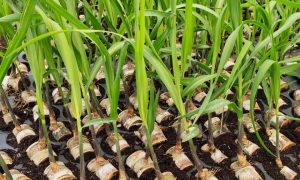Indigenous tech to help put an end to stubble burning

Researchers from Anna University and IIT Delhi have identified a potent fungal strain for producing enzymes crucial in converting paddy and wheat straw into bioethanol, aiming to reduce stubble burning. This breakthrough could cut down on the 25% cost of imported enzymes. Anna University plans to scale up production with Hindustan Petroleum Corporation, potentially aiding India’s goal of increasing ethanol blends in petrol. The move could alleviate crop burning issues and bolster farmer revenues.
Chennai: Researchers have removed an important bottleneck in producing enzymes that can be used to
convert paddy and wheat straw waste into bioethanol. This can minimise stubble burning. Researchers from Anna University and IIT Delhi have now identified a fungal strain that produces large amounts of
the much needed enzyme indigenously. Currently, the enzymes needed for bioethanol are
imported, which accounts for 25% of total cost of ethanol made from rice straw or any other plant biomass waste.
Enzymes play an important role in converting wheat and rice straw into glucose. Then yeast cells are used to ferment the glucose into bioethanol. “We have achieved higher enzyme activity with the selected strain. The industry is now satisfied that the fungus is making enough enzymes for it to be commercially viable,” said professor S Ramalingam, from the department of biotechnology, Anna University. A team
headed by him developed this process. To scale up production and improve efficiency Anna
justified? To scale up production and improve efficiency, Anna University has entered into an agreement with Hindustan Petroleum Corporation Limited Green R & D, Bengaluru, for using the process for manufacturing bioethanol in the newly proposed second generation plants in places such as
Bhatinda.
India is currently adding 10 % of ethanol, targeting to blend more bioethanol into petrol to reduce the reliance on fuel import. “It could also contribute to meeting the increasing ethanol blend target, alleviate a longstanding crop burning issue and create additional revenue to farmers,” he added. So far, technology for producing enzymes has not been commercialised due to the high production cost as the
enzymes were imported.
“Not only do we have very good fungus which produces enzymes, we are trying to modify the fungus genetically to make it produce even larger quantities of enzymes,” said professor K J Mukherjee, department of biochemical engineering and biotechnology, IIT Delhi.
To control the pollution, Govt of India has launched financial support to 12 Integrated bio-ethanol projects using renewable feedstock with an outlay of 1,969crore. In the next few years, agricultural waste such as rice and wheat straw could also yield profits to farmers if bioethanol production is at a larger scale. This will also help the petroleum industry to generate green fuel.














